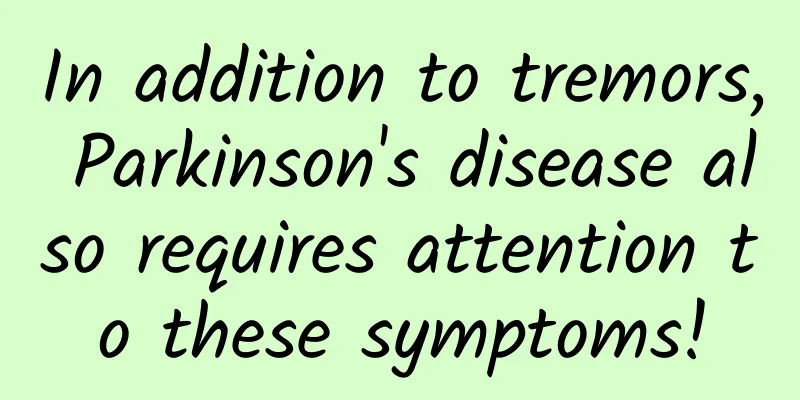In addition to tremors, Parkinson's disease also requires attention to these symptoms!

|
Author: Chen Haibo, chief physician of Beijing Hospital Reviewer: Xu Jun, Chief Physician, Beijing Tiantan Hospital, Capital Medical University As we all know, the main manifestations of Parkinson's disease are symptoms such as resting tremor, bradykinesia, and muscle stiffness. In the past, it was believed that Parkinson's disease only affects motor ability and mobility, but current research has found that Parkinson's disease also has some "non-motor symptoms" that affect all aspects of the patient. 1. Emotional and mental abnormalities. According to a survey, 40%-60% of Parkinson's disease patients will experience depression, anxiety and other emotional problems during the course of the disease. Emotional problems can be clinically divided into several different types: One is reactive. When patients hear that they have Parkinson's disease, they may feel fear, anxiety, and depression because they know that Parkinson's disease cannot be cured at present. The second is fluctuating depression. Depression may be better or worse during the day. After taking levodopa, motor symptoms improve and mood improves. When the effect of the drug is about to wear off, the related problems reappear before the next dose of the drug. After taking the drug again, it gets better. There is also a major type of depression, called endogenous depression, which is caused by the pathological changes of the disease itself, resulting in insufficient serotonin and norepinephrine, resulting in depression and anxiety. At the same time, many people also have emotional indifference. In addition, some patients will experience hallucinations and delusions in the middle and late stages of the disease. For example, they may see a room full of people having a meeting at home, but in fact, no one is home. Another example is that when they see others whispering, they think they are saying bad things about them and want to harm them, or they suspect that their partner is cheating on them, etc. 2. Sleep disorders. Parkinson's patients often doze off during the day. Many patients experience poor sleep at night, difficulty falling asleep, early awakening, and nightmares before the onset of Parkinson's disease movement symptoms. Nightmares are very common, such as being chased by bad guys, fighting with bad guys in dreams, or even punching and causing accidental injuries. This is called sleep behavior disorder. This can then cause daytime sleepiness. Figure 1 Original copyright image, no permission to reprint If the patient simply has difficulty falling asleep, some short-acting sleeping aids, such as zopiclone, can be used to help him fall asleep. If patients are prone to vivid dreams, hitting movements, or non-stop speeches during REM sleep, they can use health products or drugs such as melatonin or clonazepam to suppress and reduce body movements. Of course, I would like to remind everyone here that all medicines should be used under the guidance of a doctor and not taken at will to prevent adverse consequences. 3. Autonomic nervous system damage. For example, orthostatic hypotension means that after the patient stands up from a lying position, the systolic pressure will differ by more than 20 mmHg, and the diastolic pressure will differ by more than 10 mmHg. If either of the standards is met, it is called orthostatic hypotension. If the systolic blood pressure is very high when lying down, reaching 160mmHg, and drops to 130mmHg when standing up, there may be no symptoms. However, if the systolic blood pressure is 120mmHg or 110mmHg when lying down, it will drop below 90mmHg when standing up. At this time, the brain is not getting enough blood supply, and dizziness, fainting, and syncope will occur. This is very common in patients with Parkinson's disease in the middle and late stages. In addition, urinary dysfunction, such as frequent urination, urgency, even incontinence or dysuria, or excessive sweating and the need to change clothes constantly, also belong to autonomic nerve damage. In clinical practice, targeted treatment is required according to the specific situation of the patient. 4. Abnormal gastrointestinal function. Sometimes it is difficult to completely distinguish some gastrointestinal symptoms from autonomic nerve damage. For example, constipation is a gastrointestinal dysfunction and is also related to the autonomic nerves, because the intestines are controlled by the autonomic nerves, but constipation is definitely a gastrointestinal symptom. In clinical practice, some patients do not defecate for more than ten days, which will cause the stool to dry up in the intestines, causing intestinal obstruction, and ultimately only surgery is needed for treatment. Therefore, constipation is a problem that needs to be taken seriously by everyone. Figure 2 Original copyright image, no permission to reprint Some patients may drool, which may be related to poor swallowing function. Parkinson's patients will swallow more slowly, and even have difficulty swallowing, but the amount of saliva secreted is normal. The secreted saliva cannot be swallowed and will naturally flow out, so they will drool too much. This is a gastrointestinal symptom. 5. Sensory symptoms. Sensory symptoms include olfactory impairment, as well as pain and numbness. The most common type is joint and muscle pain, and a small number of them are neuralgia. Joint and muscle pain mainly affects the knee joint, hip joint, and shoulder joint. Including the muscles around the joints, you can also feel some pain. This is the most common type. Some patients experience shoulder pain in the early stages of the disease and treat it as shoulder arthritis or periarthritis of the shoulder; some experience cervical neuralgia and think it is cervical spondylosis and treat it as such. Therefore, this non-motor symptom that appears in the early stages of Parkinson's disease is very easy to misdiagnose. 6. Cognitive impairment. Cognitive impairment is a common non-motor symptom of Parkinson's disease and can occur at any stage of Parkinson's disease. Mild cognitive impairment in Parkinson's disease appears in the early stages of the disease, even before motor symptoms. It often develops insidiously, progresses slowly, and may gradually progress to Parkinson's disease dementia. Specifically, it manifests as impairment of one or more cognitive domains in executive function, memory, attention, working memory, language ability, and visual-spatial ability. Among them, executive function impairment is the most characteristic, which is generally manifested as difficulty completing daily and routine tasks, and is more prominent when performing more complex tasks. The patient's memory function impairment is mainly manifested in short-term memory and instant memory impairment, while long-term memory impairment is not obvious. In addition, the number-related memory functions of patients with mild cognitive impairment in Parkinson's disease, such as number sequence memory and number calculation ability, remain relatively intact. Therefore, cognitive impairment in Parkinson's disease is one of the important reasons that affect the quality of life of patients, accelerate disease progression and increase family burden. 7. Other symptoms. There are some other symptoms that cannot be accurately classified into a certain system. For example, patients are prone to fatigue and weight loss. Some patients lose weight significantly for unknown reasons within a year, but they do not have tumors and eat normally. Often, no clear reason can be found. Of course, the patient's weight will not drop forever. Often in a certain year, the patient's weight will suddenly drop by ten or twenty kilograms. This phenomenon can also be seen in Parkinson's patients. The above six categories of symptoms are the non-motor symptoms of Parkinson's disease. |
Recommend
Why are van wheels so small? Why are van tires narrower than sedan tires?
Vans can be seen everywhere. Many people use them...
Why are women sexually indifferent?
Sexual apathy is a condition in which there is no...
Why does it hurt down there during menstruation?
Every month women have a few days when they feel ...
How to treat diarrhea during menstruation
Girls have their periods every month. They are ve...
Why does a woman have light pink vaginal discharge?
Women must pay attention to their reproductive he...
Recipes for women to replenish qi and blood
Female friends often need to supplement their bod...
Will you lose weight after a miscarriage?
It is said that pregnancy is the happiest time in...
Will drinking alcohol during menstruation cause amenorrhea?
Menstruation is a normal physiological cycle for ...
What to do if your thigh hurts after a normal birth
When women give birth, except for special reasons...
Can uterine prolapse be cured?
After suffering from uterine prolapse, women usua...
After 3 surgeries in 4 months, the premature baby can finally poop from his butt
The previous article told about my thrilling expe...
What foods are good for the fallopian tubes?
If a woman has not yet planned to have a baby, sh...
What are the benefits of eating seaweed for women
What is seaweed? It is a kind of food with relati...
How to use extra virgin olive oil? Is olive oil a vegetable oil?
Olive oil is considered to be the most suitable o...









